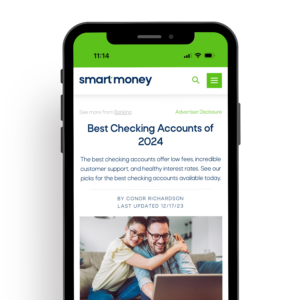Takeaways
- Cryptocurrency is a digital currency that uses cryptography and lacks central authority.
- Many cryptocurrencies use blockchain to create a permanent transaction record.
- Cryptocurrencies are a medium of exchange, investment, and securing smart contracts.
- Investing in cryptocurrency involves understanding the types, risks, and potential gains.
- Cryptocurrencies are easily purchased on exchanges, like buying stocks or bonds.
Some of the links in this article are from advertising partners of Smart Money, which does not influence our evaluations or recommendations. We work to provide you with accurate and reliable information. Our opinions are our own.
What is Cryptocurrency?
Cryptocurrency, or "crypto," is a digital representation of value or virtual currency that depends on cryptography for its operation and security. Cryptography is a form of digital security that hides or codes information so that only the person intended to receive the message can actually read it. The power of cryptography technology makes it virtually impossible to counterfeit cryptocurrencies with current technology.
One of the unique features of cryptocurrencies is that they operate without a central authority, like a government or financial body. A lack of central controlling authority is also the difference between cryptocurrencies and currencies like the U.S. dollar, which the Federal Reserve controls.
At the core of nearly all cryptocurrencies is blockchain technology [1]. Blockchain acts as the unchangeable record of all transactions on a network. Blockchain technology ensures the network stays secure and stops any single entity from controlling the entire network. Each transaction on the network, whether a new currency is created or sent to or from users, is linked to the previous block. That block depends on the one before that, and so on, back to the beginning of that cryptocurrency.
A blockchain secures the currency's supporting structure and creates an unalterable record of transactions. The blockchain record forms trust among crypto users because it provides an open view into prior and current ownership.
The idea of cryptocurrency began in 2009 when the first and most well-known cryptocurrency, Bitcoin, was created. It was created as a peer-to-peer payment system using the equivalent of electronic cash to facilitate transactions directly between users. These transactions did not rely on third parties or similar intermediaries. In 2024, Bitcoin has a market capitalization of over $1.3 trillion [2].
Get Smart With Your Money
Fresh weekly articles delivered straight to your inbox.
Enter your name and email for free tips and tricks.

Since the inception of Bitcoin, thousands of alternative cryptocurrencies have followed suit, with many failing to gain steam. Typically, cryptocurrencies have tried to fill specific market niches to create usefulness, from individual industries like medical networks, decentralized file storage, and more, detailing a wide range of use cases.
One of cryptocurrency's leading benefits is its variety of potential applications. You can use cryptocurrencies as a medium of exchange, much like you would with a U.S. dollar bill. Instead of paying for your cappuccino with a paper bill, you can pay with a mobile app that houses your money. Additionally, you can invest in cryptocurrencies, just like you can invest in currencies like the U.S. dollar or Euro.
Another prominent feature of cryptocurrencies is that they can be used when making secure smart contracts. Smart contracts are written with code. This coding allows them to self-execute and self-enforce directly on the blockchain. The terms of the contract are written directly into the contract, and the blockchain processes ensure that the contract operates as written without the need for a middleman. This can help reduce costs in the long run.
Like most investments, the valuation of a particular crypto is driven purely by market supply and demand. A crypto’s market demand is a milieu of factors like perceived value, overall scarcity, and technical utility.
For example, Bitcoin is limited to exactly 21 million coins, which creates scarcity [3]. On the other hand, Ether, created constantly for its functionality and smart contracts, is used less for its payment capacity. Ether is more of a digital asset that fuels contracts, networks, and applications.
How to Invest in Cryptocurrency
If you consider investing in cryptocurrency, you may wonder where to start. Understanding how that market operates is the first step in any new investment style or asset class.
The crypto landscape can be incredibly volatile and dynamic. Volatility is the sense that the value of specific coins or tokens can fluctuate wildly (up and down). This volatility can create an environment of massive investment gains or losses. Because of this volatility, many financial professionals recommend allocating a percentage of your net worth to crypto to gain exposure to this asset class, just like you would with stocks, bonds, or real estate. However, they advocate for diversification, so you are not over-indexed to cryptocurrency.
One of the first orders of business is to familiarize yourself with the different types of cryptocurrencies available and how each one works.
The most widely used cryptocurrencies include:
- Bitcoin
- Ethereum
- Tether
- BNB
- Solana
While there are broader rules for how cryptocurrencies operate, each individual cryptocurrency can have idiosyncratic levers that pull value up or down, just like a country's currency might have specific reasons for fluctuation.
Before investing in anything, you should familiarize yourself with the investment risks. One of the most significant current risks in crypto is that the market is still largely unregulated. This opens the door for bad actors and subpar exchanges.
Read More -> What is the Securities and Exchange Commission (SEC)?
Not all cryptocurrencies are the same. You can investigate the origins of a cryptocurrency and its supporting community to get a sense of what drives value. Investor sentiment around a particular currency can give you an idea of the health of that crypto market and its potential for long-term gains.
Where Do You Buy Cryptocurrency?
Once you have read up on the various cryptocurrencies, you will need to decide what platform to use to purchase your coins. Most investors buy their crypto from either exchanges or brokers. In either case, this is where you convert your U.S. dollars into digital assets.
Large Exchanges
Many investors create accounts with one of the many large exchange platforms. Platforms like Coinbase have existed since the inception of crypto, while platforms like Kraken and Binance are newer.
Coinbase is well-known for having an easy-to-use interface, while options like Binance offer some of the widest varieties of cryptocurrency coins or tokens.

Coinbase Website
Coinbase
Smart Money Rating: 4.5/5
Best For: Investing in Crypto
Bonus Offer: Buy Bitcoin from just $10
Brokers
The days of Boiler Room brokers are long gone, and brokers have largely been digitalized. Brokers are now wrapped in fintech apps like Robinhood or Cash App that let you link a debit card or checking account to buy Bitcoin and other cryptos in seconds. You can accumulate crypto in your online brokerage account or send it to a private wallet (more information on this below).
From the beginning of 2024, you can buy cryptocurrencies like Bitcoin through regular online brokerages and Bitcoin exchange-traded funds (ETFs). In fact, since regulatory approval, U.S.-listed Bitcoin ETFs have seen billions of dollars flow into the crypto ETFs [4].
5 Steps to Start Investing in Crypto
Diversification is about investing in a variety of asset classes. If you are ready to get started investing in crypto, here are the five steps you need to take:
1. Create Your Account
Investment platforms are online brokerages that allow you to buy and sell cryptocurrencies easily. Before investing, you need somewhere you buy; before you can buy from anywhere, they need to know who you are. Decide whether you buy from a brokerage or an exchange. You can start the sign-up process once you decide which one to use.
No matter what option you choose, sign-up will be fast. Exchanges and brokerages both need your personal information, verification of your identity and sometimes information about your investment strategies.
2. Fund Your Account
Once you have set up and signed in to your account, you must fund it with cash. Funding your account will allow you to purchase whole or fractional coins based on the current conversion rate from U.S. dollars to crypto ratio.
If you use an app like Cash App to buy Bitcoin, you can set up your account to pull funds from your checking account or savings account for each purchase.
Exchanges fund their accounts a bit differently. If you use an exchange, you must transfer money via a credit card, debit card deposit, or wire transfer. Wire transfers are typically used only for large deposits or withdrawals.

Member FDIC
Axos Bank® Rewards Checking
Smart Money Rating: 5/5
APY: 3.30% with No Minimum Balance
Bonus Offer: Up to $300 Bonus (Terms Apply)
3. Research Cryptos
Before investing in anything, you should do some serious due diligence. Researching cryptocurrencies is an absolute must before putting your hard-earned savings into crypto. In fact, you should have the same intensity of research as if you were going to purchase a large stock purchase. Before you choose a crypto to invest in:
Be sure you clearly understand the crypto project and its market. You want to know the market's size, projected growth rate, user demand, etc. Be aware of competitors in the industry and how your potential choice has elected to differentiate itself from the competition.
You need to understand the general technology and infrastructure behind the currency.
Remember to diversify your informational channels, including industry whitepapers, currency websites, academic papers, and traditional media. You can augment this by talking to financial advisors and financial planners about how their clients handle crypto exposure.
4. Purchase Your Cryptocurrency
Now that you have decided on the crypto you will purchase, you need to determine at what price. You can initiate your purchase on a typical exchange by creating an order like a traditional stock exchange (think NASDAQ or NYSE), including similar order types.
- Market orders will buy a specified USD value or quantity of a particular crypto at the currently available market price.
- Limit orders will let you select an amount to purchase and the maximum amount you are willing to pay, and that order may or may not be filled at that price.
Once you create your buy order, the exchange will match it with an existing sell order. If successful, the exchange will complete the transaction, and the purchased crypto will flow to your account after the appropriate number of block confirmations.
5. Store Your Purchase
The most important part of owning cryptocurrency is safely and securely storing it once it is yours. There are two ways to do this: hot wallets and cold wallets. The right one for you depends on your daily crypto needs. Let’s take a look at the storage options:
Hot Wallets
Hot wallets are in the cloud or computers and devices connected to the internet. They provide convenient access to your crypto for frequent transactions like buying and selling, mining, or using your crypto for daily purchases.
Hot wallets are generally free to use and offer features like trading platforms. The downside to hot wallets is that they are more vulnerable to security and phishing attacks from hackers trying to access your crypto.
Cold Wallets
Cold wallets refer to offline storage methods on physical hardware. Cold wallets are disconnected from the internet and, as a result, offer the highest level of security for your crypto.
Because cold wallets are offline on devices, they are more challenging to access. However, you can transport cold wallets virtually anywhere.
Smart Summary
The rise of cryptocurrency is a more recent phenomenon. Investors have embraced its universal payment appeal, high levels of security, and growing adoption. If your portfolio needs some alpha or you are simply interested in learning more about cryptocurrencies, it might make sense for you to pick your favorite coin and start investing. Like any asset class, you should constantly monitor your holding to ensure you are indexed appropriately to meet your financial goals. Cryptocurrencies could be an investment fad or the wave of the future in digital payments.
Frequently Asked Questions
Cryptocurrencies are legal in the U.S. and many other countries around the world. However, countries like China have essentially banned their use or limited their viability. Some countries view cryptocurrencies as a threat to their centralized monetary policy.
Buying and selling cryptocurrencies is much like trading stocks and bonds. When you dispose of a currency, you are taxed on the difference between your purchase and selling price. Depending on when you buy the currency, you will owe either short-term or long-term capital gains. Read more about the best online tax software to use.
Let’s be honest: cryptocurrencies have not been around for as long as traditional stocks, ETFs, mutual funds, or other equity-derived investments. Cryptocurrencies are in their infancy, but that does not mean they are a terrible investment. Where they sit today offers a double-edged sword. Investors can purchase a novel investment at low valuations or something similar that will decline in value over time. Revisit your financial goals and talk with a financial advisor about how cryptocurrency exposure could benefit your investment portfolio. Read more about currencies like Bitcoin.
(1) PWC. Bitcoin, cryptocurrency, blockchain…so what does it all mean? Last Accessed April 3, 2024.
(2) Yahoo Finance. Bitcoin. Last Accessed April 3, 2024.
(3) Blockchain Council. How Many Bitcoins are There and How many are Left to Mine in 2024? Last Accessed April 3, 2024.
(4) Reuters. US bitcoin ETFs see $4.6 billion in volume in first day of trading. Last Accessed April 3, 2024.









